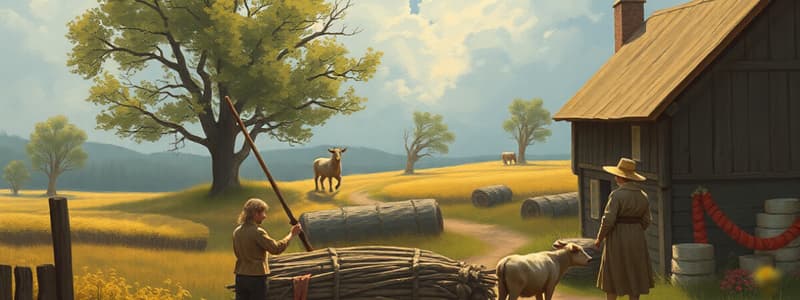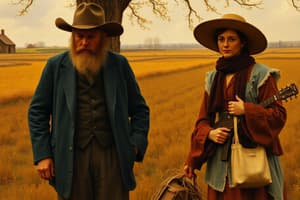Podcast
Questions and Answers
What was one major issue that farmers faced due to federal economic policies?
What was one major issue that farmers faced due to federal economic policies?
- Availability of land for farming
- Increased tariffs on imported goods
- High demand for agricultural products
- Low inflation rates making debts harder to pay (correct)
What was the primary objective of the Grange and Farmers' Alliances?
What was the primary objective of the Grange and Farmers' Alliances?
- To promote industrial growth
- To combat unfair economic practices affecting farmers (correct)
- To inflate the value of currency
- To establish monopolies in agriculture
What was a significant outcome of the Munn v. Illinois case?
What was a significant outcome of the Munn v. Illinois case?
- Federal control over all state economy
- The Supreme Court ruled that businesses affecting public interest could be regulated (correct)
- Railroads were exempt from government regulation
- States could regulate any business without limitation
Which political party emerged from the efforts of farmers to address their economic grievances?
Which political party emerged from the efforts of farmers to address their economic grievances?
What did the Populist Party demand in terms of taxation?
What did the Populist Party demand in terms of taxation?
What was the effect of the Wabash Case on state regulations?
What was the effect of the Wabash Case on state regulations?
What was the main focus of William Jennings Bryan's 'Cross of Gold' speech?
What was the main focus of William Jennings Bryan's 'Cross of Gold' speech?
What significant economic shift occurred during the Gilded Age affecting farmers?
What significant economic shift occurred during the Gilded Age affecting farmers?
What was one primary focus of the Granger movement?
What was one primary focus of the Granger movement?
Which of the following factors contributed to the difficulties faced by Gilded Age farmers?
Which of the following factors contributed to the difficulties faced by Gilded Age farmers?
How did the transcontinental railroad influence farming at this time?
How did the transcontinental railroad influence farming at this time?
What was a consequence of the surplus in agricultural production?
What was a consequence of the surplus in agricultural production?
What role did Grange networks play during the late 1800s?
What role did Grange networks play during the late 1800s?
Why did the farmers' financial situation deteriorate in the Gilded Age?
Why did the farmers' financial situation deteriorate in the Gilded Age?
What was a significant consequence of the Panic of 1873 for farmers?
What was a significant consequence of the Panic of 1873 for farmers?
Flashcards
Gilded Age farming distress
Gilded Age farming distress
Farmers in the late 1800s faced economic hardship due to falling crop prices, mounting debt, and declining export markets.
Increased agricultural output
Increased agricultural output
Technological advancements and new land cultivation led to a significant rise in agricultural production in the late 1800s.
Farmer's Alliances
Farmer's Alliances
Groups of farmers united to address their economic problems, growing out of the earlier Granger movement.
Railroad costs disparity
Railroad costs disparity
Signup and view all the flashcards
Granger Movement
Granger Movement
Signup and view all the flashcards
Panic of 1873
Panic of 1873
Signup and view all the flashcards
Protective tariffs
Protective tariffs
Signup and view all the flashcards
Urbanization
Urbanization
Signup and view all the flashcards
Granger Laws
Granger Laws
Signup and view all the flashcards
Munn v. Illinois (1877)
Munn v. Illinois (1877)
Signup and view all the flashcards
Wabash Case (1886)
Wabash Case (1886)
Signup and view all the flashcards
Populist Party
Populist Party
Signup and view all the flashcards
Free Coinage of Silver
Free Coinage of Silver
Signup and view all the flashcards
Cross of Gold Speech
Cross of Gold Speech
Signup and view all the flashcards
Gold Standard
Gold Standard
Signup and view all the flashcards
Study Notes
Gilded Age Farming
- America rapidly industrialized, impacting rural agrarian communities.
- Increased demand for food led to more farmland cultivation and advancements in farming technology; one farmer in 1900 produced as much wheat as 20 farmers in 1860, and 430 million acres were converted to farmland.
- This surplus led to falling prices, harming farmers burdened by debt for land, equipment, and supplies.
- Competition from South America and Europe, along with retaliatory tariffs, worsened the situation.
Granger Movement and Farmers' Alliances
- Farmers organized socially and politically in the Granger Movement (National Grange of the Patrons of Husbandry) during the 19th century.
- Membership grew during economic hardship, especially after the 1873 Panic.
- Grangers and Farmers' Alliances aimed to combat monopolistic railroad and grain elevator pricing.
- Farmers faced vastly different shipping costs depending on distance from the shipping point; long-haul rates were more than short-haul rates.
- Grange members sought cooperative ownership of equipment, establishing early credit unions to fund themselves.
- Farmers' Alliances lobbied for Granger laws (pricing caps) to combat unfair practices.
- Granger laws were successfully implemented in various midwestern states although, challenged and overturned.
Munn v. Illinois and Wabash Case
- Munn v. Illinois (1877) ruled that the government could regulate businesses affecting the public interest.
- However, the Wabash Case (1886) overturned Illinois's Granger law, asserting federal government's jurisdiction over interstate commerce, nullifying state regulations.
Populist Party
- Lack of national support for agrarian interests, and the Wabash decision drove the formation of the Populist Party (People's Party).
- Focused on currency reform, advocating for the use of silver to increase the money supply (increase inflation to help indebted farmers).
- Proposed a graduated income tax, government ownership of railroads and telegraphs, national bank abolition, and lower tariffs.
- Demanded a one-term limit for president, direct election of senators, recalls, and secret ballots.
Populists in Elections of 1892 and 1896
- James Weaver, the Populist presidential candidate in 1892, garnered nearly 9% vote.
- The Populists gained support during a subsequent economic downturn.
- Democrats adopted some Populist ideas to woo voters, such as the support of Democratic nominee William Jennings Bryan, who ran in 1896.
- Bryan's "Cross of Gold" speech was an influential support for free silver.
- Bryan was also endorsed by the Populist party in 1896, helping absorb the Populists into the Democratic party.
- Bryan lost the 1896 election to McKinley.
- The Populist Party lost their unique political identity as their constituents were absorbed into the Democratic Party.
Outcomes and Legacy
- Despite setbacks, inflationary pressures occurred, anyway, through the discovery of gold in Yukon, growing demand and European crop failures, driving up food prices.
- The Progressive Era would later address some of the Populists' issues.
- Grange reverted to social support with its continued existence.
Studying That Suits You
Use AI to generate personalized quizzes and flashcards to suit your learning preferences.
Description
Explore the significant changes in farming during the Gilded Age and the rise of the Granger Movement. This quiz covers the impact of industrialization on agriculture, the increase in farming technology, and the collective action of farmers to combat economic challenges. Test your knowledge on these pivotal movements and their historical context.




